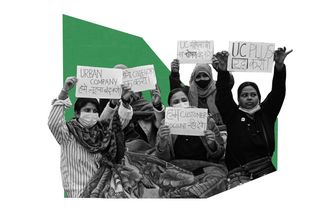
Urban Company Suing Women Gig Workers for Protesting Shows How Women’s Labor Is Undervalued
This may be the first time a tech company took legal action against its “partners,” but not the first time women workers have been devalued.

Urban Company, a home services provider, has reportedly sued gig workers who have been protesting working conditions and social security terms over the last few months. Now, during a new protest that began on Monday, the company called the protesters “illegal” and “unlawful,” according to Soumyarendra Barik who reported for Entrackr.
The incident marks the first time that a tech company reliant on the gig economy has taken legal action against protesting workers. The gig workers in question are all women, who had raised concerns about changes in the company’s policies. The new policies would “categorize” workers as “prime”, “classic” or “flexi” and force them to take up a minimum number of shifts. Called the “Minimum Guarantee” plan, workers will have to pay a fee of Rs. 3,000 or Rs. 2,000 in exchange for a minimum number of jobs. “…if I don’t do 40 jobs, I will lose Rs 3,000. This takes away our flexibility,” said a beautician, who was named in the petition. Failing to pay the subscription fee would categorize workers as “Flexi” — or flexible, freelance workers who will not get jobs from Monday to Friday. Workers will also be asked to provide customers with a 10% discount from their earnings.
Declining female labor force participation in India makes this lawsuit all the more insidious. Women face several intersecting constraints — care work in the home, safety outside the home, patriarchal norms. Now, with tech platforms, the requirement of constant access to mobile phones in households where sometimes the sole mobile phone is owned by men further impacts their access.
In the gig economy, where workers are already dehumanized and excluded from work benefits, women are that much more precarious.
Related on The Swaddle:
India’s Laws Can Only Do So Much for Women in the Workforce
Female labor has been undervalued for as long as women have worked — which is always. In the urban context, “women are working incessantly towards finding space and safety to negotiate better arrangements in life,” notes Samhita Barooah in the Economic and Political Weekly. “Women’s work is rooted in gender-specific presumptions that women are caregivers, nurturers, and custodians of resources, service providers, housekeepers, and food producers and processors,” she adds. That women gig workers were the first to be hit with a lawsuit by a tech company is not surprising, given the history of how labor is gendered and valued in India post-liberalization.
For women in work, this devaluation ends up being normalized over time, arguably culminating in the lawsuit against gig workers today. Women in gig work have been relatively understudied, but they face a double-bind as compared to their male counterparts: safety concerns, and devalued care labor. Urban Company remains one of the few platforms with a predominantly female workforce, owing to the fact that the services on offer are feminized — beauty and cleaning.
The excessive labor force, coupled with the expansion of tech, has led to a “gig” economy in which people take up work under precarious circumstances. Tech companies exploit the availability of labor by imposing harsher terms of using the platform, and effectively strong-arming workers into compliance. Previously, women working with Urban Company objected to unfair wages, working conditions, lack of social security measures, and even exploitation.
Since the gig workers are not “official employees,” they remain vulnerable to any legal move. Urban Company claimed that the workers “decided to repeatedly derail the collaborative and cooperative process for their unknown ulterior motives and vested interests”.
Related on The Swaddle:
Government to Track the Value of Women’s Unpaid Housework
“It seems that the [women] are bent upon making [Urban Company] agree to their further illicit and despicable demands, which will end up illegitimately enriching the [protestors] while the genuine concerns, if any, of the Partners remain unaddressed and unheard,” the company petition stated. But the workers note that despite some discussions with the CEO, no settlement was agreed upon.
The platform’s response is harsh, but not unsurprising. Urban Company is a service aggregator that offers beauty, cleaning, and repair services to customers online. It works on a model similar to that of tech companies like Ola, Uber, Swiggy, or Zomato. The idea is that “partners” will be assigned to each order on the app or website, in exchange for having a platform guaranteeing a steady source of customers. But the model distances workers from employment entitlements — because platform companies do not officially call them employees. Instead, they are called “partners” — effectively allowing companies to shrug off any onus towards ensuring safe and secure working conditions for people.
Much has been written about women in the informal sector — domestic workers in particular — not being paid their due because of gendered assumptions about domestic work coming “naturally” to them. The idea permeates into healthcare too, where nurses and healthcare workers like Anganwadi workers and Accredited Social Health Activists (ASHAs) are underpaid and undervalued. Even teachers, cooks, garment workers, and beauticians face the same issue.
A parallel protest on the Chandigarh-Kharar highway tells a similar story. Anganwadi workers took to the highway to protest low and irregular wages recently, which was framed as one that “irked” commuters by blocking traffic.
The indifference and non-cooperation towards women workers are therefore not new — but still haunting in how they continue to marginalize women.
Rohitha Naraharisetty is a Senior Associate Editor at The Swaddle. She writes about the intersection of gender, caste, social movements, and pop culture. She can be found on Instagram at @rohitha_97 or on Twitter at @romimacaronii.
Related


Madras HC Issues Guidelines to Prevent Discrimination Against Disabled Women Athletes
